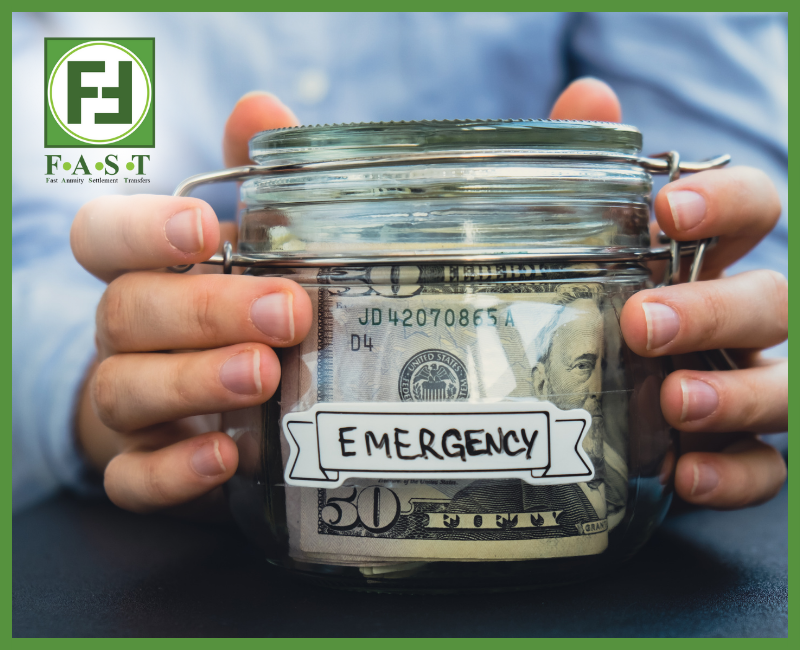

Life can be unpredictable. Unexpected events, from job loss to car trouble, can throw a wrench into even the most well-oiled financial plans. By taking proactive steps, you can create a financial safety net that helps you weather any storm.
If you haven’t done so already, now is a good time to emergency-proof your finances. Doing so can help limit your overall disruption, lower your stress, and put you in a better position to ride out any emergency—whether it’s a family crisis, a hurricane, or a global economic crisis.
While it’s difficult to predict when, or if, a recession will hit, downturns happen eventually because the economy goes through boom and bust cycles. When the Dow Jones Industrial Average (DJIA)—the “Dow”—fell 777.68 points (6.98%) in intraday trading on Sept. 29, 2008, it was the largest point drop in history. Today, we can almost feel nostalgic remembering the good old days when DJIA losses were measured in hundreds, instead of thousands.
In 2020, when the U.S. first realized the seriousness of the economic crisis and lockdown—and that a recession was likely unavoidable—the markets sustained epic losses that make the 2008 financial crisis look like small potatoes. The stock market crash of 2020, as it’s now called, started on March 9 when the Dow fell 2,013.76 points—a 7.79% drop.
On March 11, the Dow lost 1,464.94 points to close 20.3% down from its Feb. 12 high, signaling a bear market and the end of the 11-year bull market that began in March 2009. On March 12, the Dow dropped another 2,352.6 points (9.99%). On March 16, the Dow lost 2,997.10 points (12.93%). Throughout 2020 and into 2021 the markets rebounded as optimism about vaccines and a global economic recovery took hold. But an event like the 2020 crisis shows that bear markets can arise, even amidst an otherwise healthy economy.
We never know when an emergency will strike—whether it’s a hurricane, earthquake, or your own changing financial or medical situation. It pays to have a plan in place that can help get you and your loved ones through the crisis.
It’s never too late to work on emergency-proofing your finances.
It’s easier to respond and adapt to an emergency when you’re prepared. For starters, take a look at your financial health. Pay attention to your income, savings, investments, net worth, and debt. If you’re like most people, you have room for improvement when it comes to your financial health. Here are a few things to work on:
Financial planners recommend that you should set aside three to six months’ worth of living expenses in an emergency fund. If you’re able to, it’s a good idea to save even more. Keep in mind that your emergency fund should be used only in a true emergency—such as to make ends meet when you’re unemployed, recovering from a natural disaster, or need to pay medical bills.
If you don’t have an emergency fund—or you’ve already burned through it—you might need to raise some cash as quickly as possible. Here are several options for doing so:
Any funds you borrow from your 401(k) lose the benefit of tax-deferred growth on earnings.
It’s a lot easier to face an emergency if you don’t have a lot of debt. Good debt has the potential to increase your net worth—such as borrowing for college, a home, or a small business. Bad debt is when you borrow to buy something that doesn’t increase in value or generate income, including cars, clothes, and most credit card debt. Whether you’re facing an emergency or not, it’s always a good idea to avoid bad debt, as much as possible. Still, if you can’t pay your bills due to an emergency, you may be able to:
Insurance is an essential part of emergency planning. Review your insurance (including property, health, life, car, and umbrella policies) to make sure you have the right amount of coverage and to make changes, if necessary. Look at whether you should buy disability insurance to help replace earned income, should you become too disabled to work.
You may be able to save money on your premiums by taking advantage of any available discounts, such as for bundling your car and property insurance. It’s a good idea to call your insurance provider once a year (for instance, when you get your renewal notice in the mail) to make sure you’re not missing out on any deals.
Making sure you have adequate health insurance is only one aspect of your overall healthcare. To prepare for emergencies, it’s essential that you also have a medical power of attorney, a legal document that gives one person the power to act for or, on behalf of, someone else.
Also important: Anyone over age 18 must give written permission for someone else to receive medical information about them—even if the other adult is a parent. You’ll need a medical power of attorney to make decisions on your adult child’s behalf if they become incapacitated. So, in addition to making sure you have assigned that power to someone in case something happens to you, be sure both adult children and other adults in your family have these documents in place.
Along with a medical (and a financial) power of attorney, everyone needs a will, even if you’re a long way from being old. A will is a legal document that sets forth your wishes. If you die without a will, your wishes may not be carried out and, when your estate goes into probate, a court will be in charge and additional fees will likely be imposed.
A living will is a separate document (and also important). It sets forth your wishes for medical care if you become incapacitated, including whether you want to be resuscitated or if life support should be used to prolong your life.
Any emergency is disruptive and difficult, even when you’re prepared for it. But if you haven’t planned, it can be even more challenging. Emergencies—whether natural disasters, illnesses, or recessions—are all but inevitable, so it makes sense to prepare for them as best as you can. That way, you may be able to lessen the disruption, reduce your stress, and be in a better position to ride out the crisis.
Need access to cash? FAST puts you in control. Schedule a consultation with a financial advisor today at 855-898-3278 or visit our Instagram for ideas and tips: @fastannuities.
Reference: [https://www.investopedia.com/emergency-proof-your-finances-4800551]
A FAST team member will call you with more information and/or get you a FREE quote.
